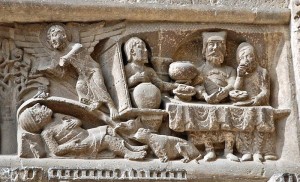“We believe in the holy, universal Church, the communion of saints.” ~Apostles’ Creed
 The early Church thought of themselves as a worldwide movement through a network of gatherings spread all over Palestine, Syria, Asia Minor, Greece, and Italy. When Paul wrote his letter to the Corinthians, he called them one group among those “everywhere who call on the name of our Lord Jesus Christ — their Lord and ours.”
The early Church thought of themselves as a worldwide movement through a network of gatherings spread all over Palestine, Syria, Asia Minor, Greece, and Italy. When Paul wrote his letter to the Corinthians, he called them one group among those “everywhere who call on the name of our Lord Jesus Christ — their Lord and ours.”
We are one people — everybody equal, everybody the same — with all Christians everywhere. Universal. One. There are so many wonderful, glorious, Kingdom things happening in and through your church. But it’s so puny compared to what God is doing globally. His Church is growing in every part of the world today except in North America. God is right now today growing his Church; he is today adding to his Church. And we are united together with all of it. One of the reasons we want people to go on short term foreign mission trips and help them pay for it is so they can watch other people following Christ. To see different cultures, different languages, different customs — to see people so different from us worshiping our God and submitting to our crucified and resurrected Lord is profound. The Church of Jesus Christ is a universal Church — all believers for all time in every place forever. One universal Church.
You love your church? Good! I love mine, too! I want you to love your church! But we’re not in competition with anybody (well, except the devil; and he’s already lost). Praise God for our brothers and sisters in the Baptist and Methodist and Presbyterian churches all over our city! Praise God for the Christian churches throughout this country and around the world who are faithfully preaching and teaching and praying and serving and living together in the name and manner of Jesus!
They might have their faults. They might have their shortcomings. They might have their misinterpretations and questionable practices. And so do we! We’ve got ours by the buckets! We’re all in this together!
“Make every effort to keep the unity of the Spirit through the bond of peace. There is one body and one Spirit — just as you were called to one hope when you were called — one Lord, one faith, one baptism; one God and Father of all, who is over all and through all and in all.” ~Ephesians 4:3-6
And, I know, some of you are pushing back on this. “Don’t talk like there aren’t any boundaries. There have to be some boundaries. You can’t talk like everybody’s in.”
No, of course there are boundaries. If a somebody comes in saying that Jesus is not from God, that Jesus is not divine, he’s out! 1 John 4. If a guy comes in bragging about having sex with his step-mother, he’s out! 1 Corinthians 5. Believe me, the Bible gives us some lines. And we need to pay attention to them. But we don’t need to obsess over it. I mean, myself, if I’m not careful, I can go from zero to Pharisee in 2.9-seconds. But I will not draw any lines of fellowship between Christians that I can’t find in the Bible. I’m too conservative.
You know the disciples see these others casting out demons in Jesus’ name and they run to our Lord with their complaint: “Make them stop, they’re not one of us.” And Jesus responds, “Just because they’re not with you doesn’t mean they’re not with me.” Elsewhere our Lord says he has sheep who are not even from this pen. He says all those sheep will hear his voice and there will be one pen and one shepherd. Drawing those lines is above our pay grade.
When the Church is splintered into different factions, when the Church is divided into different denominations, when we draw lines between us because of our differences instead of tearing down the walls because of everything we have in common in Christ, what we’re saying to the world is that the Church is not holy and it’s not universal. We can no longer in good faith justify or excuse or explain away the sin of the divisions in God’s Church. Going along with the divisions, keeping our distance from other Christians in other churches, contradicts everything we say about one Lord, one Spirit, one faith, one baptism, and one God over all.
Peace,
Allan






Recent Comments